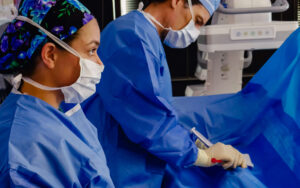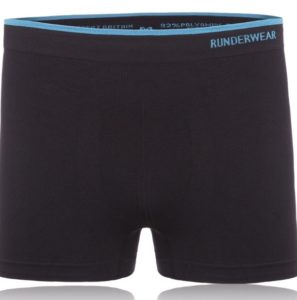If you have male infertility, a procedure known as varicocele embolization could be key to starting your family. But what are varicocele? And what is involved in this embolization procedure? Well, as it turns out, varicose veins are not just a problem that appear in your legs. In fact, varicose veins can develop in other sensitive areas of the body. And for men, one especially vulnerable area is in the testicles.
Yes, you read that correctly: about one in seven men has varicocele, or varicose veins in the testicles. With this condition, you have valve failure in the veins leading into the testicles. And that allows blood to back up, just as it does with varicose leg veins. Though it’s a mostly harmless condition, varicoceles can be linked to male infertility. And, this condition can also cause aching when you run, because exercise increases your blood flow, while gravity adds extra pressure to your sensitive parts.
Plus, with varicose veins, your risk for deep vein thrombosis (DVT) increases. And having a history of DVT can impact your risk for other intimate concerns. Which includes Penile Mondor Disease, a condition that leads to blood clots in the superficial veins of your penis.

As we mentioned, a varicocele is an enlargement of your pampiniform plexus, or scrotal, veins (that's the loose pouch of skin that holds your testicles). When working properly, your veins operate with one-way valves that help blood to flow out of your testicles and scrotum and back up to your heart. But, when those valves aren't doing their job, blood pools in your veins, making them stretch and bulge. This is true whether it happens in your legs veins or in more private parts of your body.
In some cases, causes other than valve failure contribute to varicocele. While it's the main cause of primary varicocele, you could also develop a secondary condition. Here, an external factor like a mass, or even forms of hypertension, put pressure on your testicular vein. And the result is varicose veins in this sensitive area.
Now, remember: enlarged veins aren't just a cosmetic problem. Typically, varicocele become more apparent during puberty. As blood builds up in your veins, internal pressure and temperature can also increase, from the typical 95 degrees Fahrenheit to 98.6 degrees. And that's where your fertility could be threatened: extra pressure and heat in this sensitive part of your body could damage your testicles. That could lead to decreased testosterone and sperm production, as well as poor sperm quality, all of which could impact male fertility.
With this type of varicose vein, you may experience unwanted symptoms other than challenges to your fertility. Your scrotum could get swollen or tender. The area may feel heavier than usual, or like it's dragging from your body. Also, your veins may become dilated or spaghetti-like. You could notice a worm-like mass. And your testicles can be unevenly sized, with the side of your scrotum that has varicocele appearing smaller, due to changes in your blood flow.
If you notice any of these symptoms, it's important to seek a diagnosis. Your healthcare provider can likely diagnose this vein problem with a physical testicular exam. Then, if varicose veins in your scrotum are the problem, you can reach out to us for a varicocele embolization consultation. But you should also get lifestyle recommendations. And those should include ways you can stay active while dealing with varicocele. (Or any type of vein disease!)
Exercise is always a good idea for improving blood flow and fighting vein disease. In order to keep exercise from causing or worsening varicoceles, male runners need to be very careful when selecting underwear for their runs. First and foremost, boxers are a no-go for male runners: you need underwear that has some built in support. For this purpose, a close-fitting pair of boxer briefs may be your best bet.

Another way to ensure sufficient support? Try the layered approach. Wear two pairs of underwear beneath your running shorts or pants, to create a more protective hold while you pound the pavement. You may also want to consider sport-specific underwear, since specially designed shorts will eliminate other potential irritants like sweat or painful seaming.
Of course, too much of a good thing can be a problem too. Choose underwear that's too tight, and you run the risk of cutting off testicular blood flow, which can also be problematic. You want to shoot for the Goldilocks compromise in this type of situation: test out several styles of shorts, and opt for the one that's not too loose and not too tight. Chances are, the one that's "just right" will also be the pair that best protects you from testicular varicose veins!
While rare, some men develop inflammation in their penile veins, triggering a condition called Penile Mondor Disease (PMD). That inflammation raises your risk for blood clots. And it can also cause pain or swelling in the area.
Usually, your genetics play a role in your PMD risk level. But trauma to the area (like with a sports injury) or vigorous or extended sexual encounters also up your risk. If you have PMD, your first symptom will likely be hardening of the vein on top of your penis. (This should occur between 24-48 hours after the troubling incident.) The skin may also turn red, edema may develop, and you may experience throbbing pain, especially with an erection. If you have PMD, urinating may also be painful or difficult.
We can usually diagnose PMD with a physical exam, but in some cases you'll need an ultrasound as well. In most cases, PMD clears up on its own. So your treatment will involve support for your pain and inflammation. But, for some men, this condition becomes a recurring problem. And, in those cases, you may need to treat your problematic vein. Just like you would with varicoceles.
To diagnose this condition, you'll need a physical exam. It should be done while you stand, since varicocele can become less prominent when you're lying down. Fortunately, you can treat varicocele and protect your fertility. As interventional radiologists, we treat these varicose veins using a minimally invasive procedure called varicocele embolization.
What can you expect during this procedure? First, we make a tiny incision in your groin. Next, we'll insert a thin catheter through your vein, directing it toward the varicoceles. We may use X-ray dye to better see your veins, so we can target treatment. Finally, once we've pinpointed your varicoceles, we'll inject tiny coils into the catheter, stopping blood flow to the varicoceles and alleviating pressure to the area.
Of course, we understand that treating sensitive areas can be scary. But here's the best news: during our minimally invasive treatment process, you'll be awake, but you won't be in pain. We won't need to make any incisions or cuts in your scrotum, and there's no risk of testicular loss with this procedure. Once your embolization is complete, we'll carefully observe your recovery process for several hours. Then, in most cases, we can send you home on the same day as your treatment! There, you're unlikely to face any post-operative complications. In fact, most patients recover within two to three days!
Have you noticed bulging veins in your scrotum? Or do you have a throbbing ache in your pelvic region? Are you and your partner struggling to conceive? Come in for a diagnostic vein examCome in for a diagnostic vein examCome in for a diagnostic vein exam. We can help determine if varicocele are contributing to your male infertility. We can then recommend the appropriate treatment plan to resolve your discomfort and help you build the family you've dreamed of.

Scheduling
Please contact our dedicated specialists to schedule a consultation today.
2024 Texas Endovascular. All rights reserved. Website Design by Healthcare Success